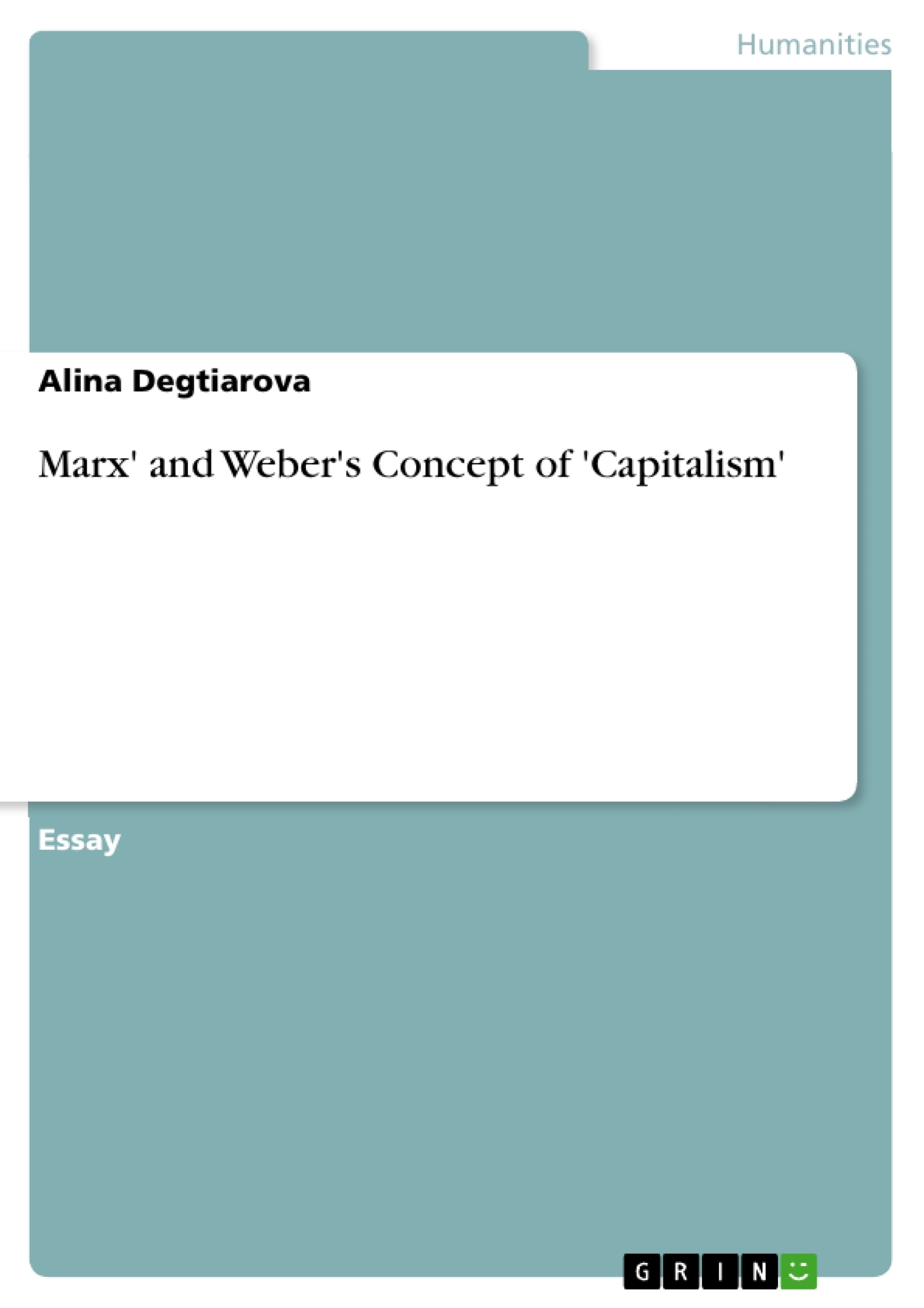Karl Marx and Max Weber are the classics of German sociology of the end of 19th and the beginning of 20th centuries. This paper provides a brief overview on Marx’ and Weber’s perception and definition of the notion of ‘capitalism’ as well as their further comparison.
Capitalism in the theories of these two prominent sociologists is represented from the different points of view, thus, the comparison promises to be significant. As the main sources for this research it is planned to use main works of Karl Marx and Max Weber on capitalism, particularly: “Capital: A Critique of Political Economy” and “The Protestant Ethic and the Spirit of Capitalism” along with analytics and criticisms of their theories, which have been done by other sociologists.
Table of Contents
- Introduction
- Weber's Understanding of Capitalism
- Marx' Understanding of Capitalism
- Weber and Marx Comparison
Objectives and Key Themes
This paper aims to provide a concise overview of Karl Marx and Max Weber's differing perspectives on capitalism. It analyzes their definitions and interpretations of the concept, highlighting the contrasting viewpoints of these influential sociologists. The main sources for this research are the key works of Marx and Weber on capitalism.
- Weber's interpretation of capitalism as a cultural and sociological concept, not merely an economic one.
- The role of religion, particularly Protestantism, in shaping Western capitalism according to Weber.
- The comparison and contrast between Marx's and Weber's understandings of capitalism.
- The significance of rationalization and the "spirit of capitalism" in Weber's analysis.
- Examination of the connection between religious beliefs and the development of modern capitalism.
Chapter Summaries
Introduction: This introductory chapter sets the stage by introducing Karl Marx and Max Weber as pivotal figures in late 19th and early 20th-century German sociology. It establishes the paper's objective: to compare and contrast Marx and Weber's understanding of capitalism, highlighting the significance of their differing perspectives. The chapter outlines the methodology, indicating that the analysis will primarily rely on the major works of Marx and Weber on capitalism, supplemented by existing sociological analyses and criticisms of their theories. The introduction promises a valuable contribution by examining these influential figures from different viewpoints.
Weber's Understanding of Capitalism: This chapter delves into Max Weber's unique perspective on capitalism, emphasizing its ethical and cultural dimensions beyond the traditional economic interpretation. Weber's analysis centers on the interplay of political, economic, and religious structures in shaping Western capitalism, identifying Protestantism as a foundational element. He refutes the simplistic view of capitalism as merely a profit-driven pursuit, arguing that while the desire for possession is a component, it is a rationalized desire. The chapter highlights Weber's interest in the origin of bourgeois capitalism and its rational organization of free labor, setting the stage for his exploration of the "Protestant ethic" and its influence on the "spirit of capitalism." Extensive use of Weber's "The Protestant Ethic and the Spirit of Capitalism" is evident throughout this chapter.
Keywords
Capitalism, Max Weber, Karl Marx, Protestant ethic, spirit of capitalism, rationalization, religious influence, economic systems, sociological theory, historical development.
Frequently Asked Questions: A Comparison of Marx and Weber on Capitalism
What is the main topic of this paper?
This paper compares and contrasts the perspectives of Karl Marx and Max Weber on capitalism. It analyzes their definitions and interpretations of capitalism, highlighting their contrasting viewpoints.
What are the key themes explored in the paper?
Key themes include Weber's interpretation of capitalism as a cultural and sociological concept; the role of religion, particularly Protestantism, in shaping Western capitalism (Weber); a comparison of Marx's and Weber's understandings of capitalism; the significance of rationalization and the "spirit of capitalism" (Weber); and the connection between religious beliefs and the development of modern capitalism.
What are the main sources used in this research?
The primary sources are the key works of Marx and Weber on capitalism, supplemented by existing sociological analyses and criticisms of their theories.
What is Weber's perspective on capitalism?
Weber views capitalism as having ethical and cultural dimensions beyond the purely economic. He emphasizes the interplay of political, economic, and religious structures in shaping Western capitalism, highlighting the influence of Protestantism. He rejects a purely profit-driven view, seeing the desire for profit as a rationalized desire.
What is the significance of the "Protestant Ethic" in Weber's analysis?
Weber argues that the Protestant ethic, particularly its emphasis on hard work and frugality, played a significant role in the development of the "spirit of capitalism" in the West. This "spirit" fostered a rationalized approach to economic activity, contributing to the rise of modern capitalism.
How does the paper compare Marx and Weber's views?
The paper systematically compares and contrasts Marx's and Weber's understanding of capitalism, highlighting their different approaches and interpretations. While the specific details of the comparison aren't provided in the preview, the framework for this comparison is established.
What is the structure of the paper?
The paper includes an introduction, chapters dedicated to Weber's and Marx's understanding of capitalism, a chapter comparing both perspectives, and a conclusion (implied). The preview provides chapter summaries to illustrate the content of each section.
What are the keywords associated with this paper?
Keywords include: Capitalism, Max Weber, Karl Marx, Protestant ethic, spirit of capitalism, rationalization, religious influence, economic systems, sociological theory, and historical development.
What is the overall objective of this paper?
The paper aims to provide a concise overview of Marx and Weber's differing perspectives on capitalism and to analyze their definitions and interpretations of the concept.
Who are the key figures discussed in this paper?
The key figures are Karl Marx and Max Weber, two pivotal figures in late 19th and early 20th-century German sociology.
- Arbeit zitieren
- Alina Degtiarova (Autor:in), 2012, Marx' and Weber's Concept of 'Capitalism', München, GRIN Verlag, https://www.grin.com/document/311753



